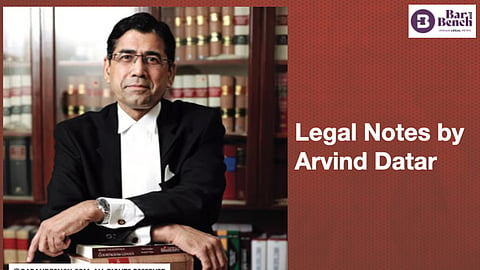
- Latest Legal News
- News
- Dealstreet
- Viewpoint
- Columns
- Interviews
- Law School
- Legal Jobs
- हिंदी
- ಕನ್ನಡ

In Gayatri Balasamy v. ISG Novasoft Technologies Ltd, a five-judge bench of the Supreme Court, by 4:1, has held that courts have a limited power to modify an arbitral award.
This brings the curtain down on the controversy of whether the courts did or did not have such power. The root cause of this problem is the unfortunate adoption of the UNCITRAL Model Law as the basis for the Arbitration and Conciliation Act, 1996. The Model Law was intended only for international commercial arbitration and applying it, almost verbatim, to domestic arbitration was a serious mistake. It is difficult to understand how such a basic error was committed, because most countries, particularly the United Kingdom, had separate provisions for domestic and international commercial arbitration even in 1996 and before.
The main problem is the scope of Section 34 of the 1996 Act, which is extremely rigid and only provides for setting aside an award. There is no express power to make any modification or change, even to a part of the award.
In National Highways Authorities of India v. MA Hakeem, and certain other decisions, it was held that the courts could not modify an award. They could either set aside the award or remand the case back to the arbitral tribunal. This view, based on a literal construction of Section 34, resulted in serious hardship to the parties concerned as they had to start the arbitration all over again. This, in most cases, was completely impractical.
On the other hand, in ONGC Ltd v. Western GECO International Ltd, a bench of three judges held that a court could either set aside or modify the award depending on whether the offending part of the award was severable or not. In several other cases, which have been referred to in the recent judgment, courts have modified the award in part. Indeed, in one case, the court went to the extent of treating the minority award as the award that had to be enforced. (See Ssangyong Engineering and Construction Company v. NHAI).
In view of this conflicting judgment, the matter was referred to a bench of five judges. It was held that courts could segregate the valid and invalid portions of an award. The “invalid portion” can then be modified or the award partially set aside, to the extent of the invalid portion. If the valid and invalid portion are incapable of being segregated, then the court has no option but to set aside the award. It observed that the greater power of setting aside the award completely must include the lesser power of modifying the award or partly setting it aside. It further clarified that the power of modification is limited and is not an appellate power. Apart from modification, the courts always have the power to correct clerical, computational or typographical errors and in specified circumstances, alter the post-award interest. Finally, it held that the power under Article 142 could be exercised, albeit with great care and caution. The minority decision has held that there is no power to modify as this was not a “limited power” but qualitatively a different power.
The majority view now resolves the conflict by holding a limited power of modification and thus relaxes the rigidity and impracticability of Section 34, which should not have been part of the 1996 Act in the first place.
It is submitted that the long-term solution to bring clarity and certainty is the substitution of Section 34 with a statutory provision similar to that prevailing in Singapore or the United Kingdom. Section 49 of the Singapore Arbitration Act, 2001 provides for an appeal against an arbitral award and the appellate court may:
(a) confirm the award; or
(b) vary the award; or
(c) remit the award in whole or part for reconsideration; or
(d) set aside the award in whole or in part.
Section 67(3) of the UK Arbitration Act, 1996 also gives the appellate court the power to confirm, vary or set aside the award in whole or part. Further, under Section 69, there is a provision for an appeal on a point of law where the appellate court has the additional power to set aside or remit an award in whole or in part. It should be noted that the UK arbitration laws have been recently amended and the reference here is to pre-amended statutory provisions which are set out in the Appendix-B of the Gayatri Balasamy judgment.
It is submitted that an amendment on the lines of the Singapore Arbitration Act can alone bring complete certainty and clarity. The sooner this is done, the better.
Arvind P Datar is a Senior Advocate.